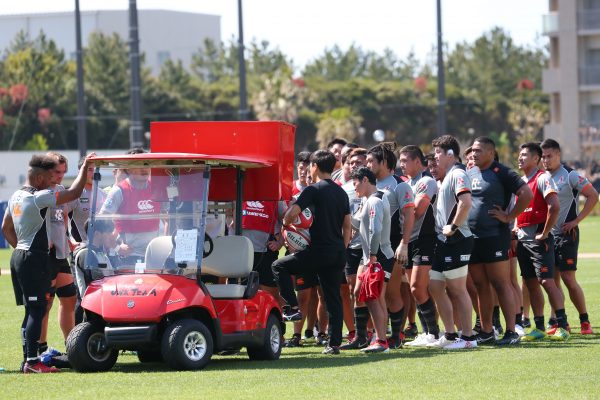Staging the Olympics in 1964 involved massive investment in new architecture and infrastructure, including housing, hotels, train, subway and monorail lines, elevated highways, and new water and sewage systems. It also accelerated the modernisation of Haneda International Airport and the Port of Tokyo, and helped launch the bullet train.
This investment in urban transformation was undertaken alongside Prime Minister Ikeda’s 1960s ‘Income Doubling Plan’ promoting rapid acceleration in manufacturing and export of Japanese products such as automobiles and electronics. The Olympics offered a prime opportunity to showcase and increase sales in advanced Japanese technology — particularly radios, cameras and TVs.
Tokyo 1964 was also an opportunity to reintegrate Japan on the international stage as a peaceful, modern nation, and to rehabilitate national identity and pride in the aftermath of the Second World War. The Emperor, the Rising Sun flag and the Self Defence Forces were revived as new symbols of peace incorporated into the Olympic narrative. Tokyo 1964 — later nicknamed the ‘Happy Olympics’ — is remembered as a symbolic event in Japanese post-war history.
In 1964, the Olympics included women’s team sports for the first time. For Japan, the inclusion of volleyball would have a powerful impact on the national psyche. 85 per cent of Japanese television-owning households watched the final between Japan and the USSR. Nicknamed the ‘Oriental Witches’, the Japanese team and their gold medal victory came to symbolise the success of Tokyo 1964. The team and their male coach were a celebrity sporting partnership that captured the nation, driving the mass popularisation of volleyball as a sport for women of all ages in subsequent decades.
Like Tokyo 1964, Japan’s hosting of RWC2019 is billed as the ‘first in Asia’.
The image of Japan as a rugby-playing nation may seem surprising — but the sport has been played there since 1866, and Japan has qualified for every RWC since the competition’s inception in 1987. While no Asian teams appear in the top 10, the men’s national team ‘Brave Blossoms’ is ranked 11th in the world. The women’s team, ’Sakura Fifteen’ is ranked 16th.
Rugby has come to play an important role in business. While the pre-war years saw the development of Japanese rugby primarily in universities, the post-war decades witnessed the growth of the sport in corporate teams. The All Japan Company Championship was established in 1948 and is the precursor to the current Top League competition established in 2003. There are 16 teams in the Top League, all bearing corporate names, with 15 directly owned by the named Japanese corporations.
Development of corporate rugby teams was spearheaded by Japanese manufacturing firms, particularly steel, automobiles and electronics — a reflection of the economic power of these sectors, as well as the dominance of male employment. Sports was initially established for factory employees to encourage exercise, wellbeing and teamwork. But with growing competition in the 1960s, corporations began to recruit top players from educational institutions, invest in competitive teams, and utilise sport for corporate social responsibility and company branding.
RWC2019 will be held in 12 host cities across Japan, with one — Kamaishi — bearing particular significance. Following the Tohoku Disaster in March 2011, the Kamaishi Seawaves local rugby team were integral to the recovery of their township via their ‘Scrum Kamaishi’ reconstruction support organisation. The Kamaishi Recovery Memorial Stadium is the only purpose built stadium for RWC2019.
Recent attempts to tout Tokyo2020 as the ‘Recovery Olympics’ have brought mixed responses from Tohoku communities, suggesting it hides and even hinders the reality and pace of reconstruction, frustrating communities where post-disaster recovery feels detached from the metropolis. But the rallying of Kamaishi recovery around RWC2019 shows a more positive response — no doubt because rugby already has an embedded history in the community.
So what are the expectations for Japan’s hosting of RWC2019 and Tokyo2020?
The RWC2019 ‘legacy’ programme aims to grow rugby across Japan and Asia, through grassroots community participation, as well as encourage the women’s game and rugby for all age-groups.
The defining message of Tokyo2020 is not yet as clear owing to its complex environment of ‘post-growth’, sustainability, aging and post-industrial technology.
Japan’s ‘Sport for Tomorrow’ initiative focusses on international exchange, peace and development — particularly with developing nations. Japan can also anchor sports mega-events around initiatives promoting regeneration across the Japanese archipelago to encourage investment in ‘new’ sectors such as tourism, travel, sport, education, healthcare and retirement.
The national and international visibility of RWC2019 and Tokyo2020, including the notable presence of foreign-born players in Japan’s Brave Blossoms team, can also help spotlight crucial social issues where Japan is critically viewed as lagging behind — notably in debates around diversity and inclusion, race and ethnicity, immigration and citizenship, disability, and gender inequality. Sports can be a vehicle to assist regional regeneration across Japan, reduce tensions in demographic transition, and further empower communication on changing social norms.
Helen Macnaughtan is Chair of the Japan Research Centre and Senior Lecturer in International Business and Management (Japan) at SOAS University of London

